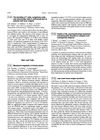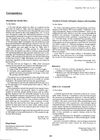 65 citations,
February 2009 in “The journal of investigative dermatology/Journal of investigative dermatology”
65 citations,
February 2009 in “The journal of investigative dermatology/Journal of investigative dermatology” Anti-acne medications may work by reducing the activity of a protein involved in acne development.
 26 citations,
April 2007 in “Journal of pediatric gastroenterology and nutrition”
26 citations,
April 2007 in “Journal of pediatric gastroenterology and nutrition” A teenage girl with high androgen levels and PCOS developed a rare liver tumor, suggesting a possible link between high androgens and the tumor's growth.
 20 citations,
April 2006 in “Dermatologic Clinics”
20 citations,
April 2006 in “Dermatologic Clinics” Antiandrogen therapies are beneficial for treating skin and hair conditions related to androgen levels.
 4 citations,
January 2015 in “Endocrinology & metabolic syndrome”
4 citations,
January 2015 in “Endocrinology & metabolic syndrome” Testosterone can cause acne and male-pattern baldness, affects hair growth in men and women, and makes male skin more sensitive.
 3 citations,
June 2009 in “Journal of The European Academy of Dermatology and Venereology”
3 citations,
June 2009 in “Journal of The European Academy of Dermatology and Venereology” Sparse hairs below frontal hairline can indicate early male balding.
 1 citations,
October 2010 in “Cambridge University Press eBooks”
1 citations,
October 2010 in “Cambridge University Press eBooks” Hormonal therapies are effective for managing hair and skin symptoms in women with PCOS.
 1 citations,
August 2020 in “British Journal of Dermatology”
1 citations,
August 2020 in “British Journal of Dermatology” Caffeine may protect hair follicles from stress-related hair loss.
 1 citations,
May 2015 in “Primary Health Care”
1 citations,
May 2015 in “Primary Health Care” Effective acne treatment varies by type, with topical and oral medications showing strong evidence, and patient education and support are crucial.
 April 2020 in “Journal of the Endocrine Society”
April 2020 in “Journal of the Endocrine Society” A patient with myotonic dystrophy had several autoimmune disorders and thyroid cancer, suggesting a possible link between these conditions.
 January 2019 in “Springer eBooks”
January 2019 in “Springer eBooks” Acne can appear or persist in adulthood due to hormonal changes, external factors, or substance use, and requires appropriate treatment.
 September 2016 in “Elsevier eBooks”
September 2016 in “Elsevier eBooks” Different types of hair loss in dogs and cats have various causes and treatments, with outcomes ranging from good to uncertain.
 January 2011 in “Elsevier eBooks”
January 2011 in “Elsevier eBooks” Alopecia in animals can be hereditary, congenital, or acquired, with treatments and outcomes varying widely.
 October 1961 in “Archives of Dermatology”
October 1961 in “Archives of Dermatology” Reassurance is important for postpartum hair shedding as it likely won't cause complete baldness.

The document is a detailed guide on skin conditions and treatments for dermatologists.
 January 2015 in “Springer eBooks”
January 2015 in “Springer eBooks” Hormones affect skin aging, and treatments targeting hormonal balance may improve skin health.
 September 1998 in “JEADV. Journal of the European Academy of Dermatology and Venereology/Journal of the European Academy of Dermatology and Venereology”
September 1998 in “JEADV. Journal of the European Academy of Dermatology and Venereology/Journal of the European Academy of Dermatology and Venereology” The document concludes that individualized treatments for hair issues are effective, certain hair changes can indicate neurocutaneous diseases, specific lotions improve skin health, laser hair removal works but needs more study on long-term effects, men's cosmetics are diverse, peeling is effective but can have side effects, and facial pigmentation is often due to overactive skin cells.
 September 1997 in “Journal of the European Academy of Dermatology and Venereology”
September 1997 in “Journal of the European Academy of Dermatology and Venereology” Adults can develop late-onset loose anagen syndrome, which may often be misdiagnosed.
 September 1997 in “Journal of the European Academy of Dermatology and Venereology”
September 1997 in “Journal of the European Academy of Dermatology and Venereology” People with acne have more CD4+ immune cells in their skin than healthy people.
 September 1987 in “International Journal of Dermatology”
September 1987 in “International Journal of Dermatology” Dr. Baral observed that applying minoxidil can cause hair to grow in areas other than where it was applied.
 September 1997 in “Journal of The European Academy of Dermatology and Venereology”
September 1997 in “Journal of The European Academy of Dermatology and Venereology” Alopecia linked to higher anxiety and personality disorders.
 93 citations,
January 2016 in “British Journal of Dermatology”
93 citations,
January 2016 in “British Journal of Dermatology” Eating a high-glycemic diet may worsen acne by increasing certain protein levels and expressions in the skin.
 88 citations,
January 2011 in “Annals of Dermatology”
88 citations,
January 2011 in “Annals of Dermatology” The document concludes that specific itchy skin diseases during pregnancy have varying fetal risks and treatments, including corticosteroids and other medications.

research Acne
81 citations,
January 2002 in “American journal of clinical dermatology” Hormonal treatments can help with acne, especially in women, by lowering androgen levels or blocking their effects.
 76 citations,
December 2009 in “Clinics in Dermatology”
76 citations,
December 2009 in “Clinics in Dermatology” Hormonal treatments can help with acne but are not the first choice due to side effects and the need for careful patient selection.
 75 citations,
June 1999 in “Pediatric Clinics of North America”
75 citations,
June 1999 in “Pediatric Clinics of North America” The document concludes that early recognition and treatment of PCOS in adolescents is crucial for managing symptoms and long-term health risks.
 48 citations,
March 1997 in “Veterinary Dermatology”
48 citations,
March 1997 in “Veterinary Dermatology” Some cats with sudden hair loss and tiredness might have cancer-related alopecia.
 42 citations,
July 2015 in “Journal of The American Academy of Dermatology”
42 citations,
July 2015 in “Journal of The American Academy of Dermatology” The conclusion is that oral contraceptives and antiandrogens can treat hirsutism and acne in women with cutaneous hyperandrogenism, but more research is needed for effective treatments, especially for hair loss.
 32 citations,
November 1996 in “International Journal of Dermatology”
32 citations,
November 1996 in “International Journal of Dermatology” Antiandrogens can help treat skin conditions like acne and excessive hair in women when used carefully.
 30 citations,
September 2005 in “Best Practice & Research Clinical Rheumatology”
30 citations,
September 2005 in “Best Practice & Research Clinical Rheumatology” The document concludes that treating tough skin disease in lupus involves sun protection, steroids, antimalarials, and various other therapies chosen based on individual risks and benefits.
 21 citations,
July 2014 in “Clinics in Dermatology”
21 citations,
July 2014 in “Clinics in Dermatology” Hormonal contraceptives can help treat acne by affecting sebum production and androgen levels.






























